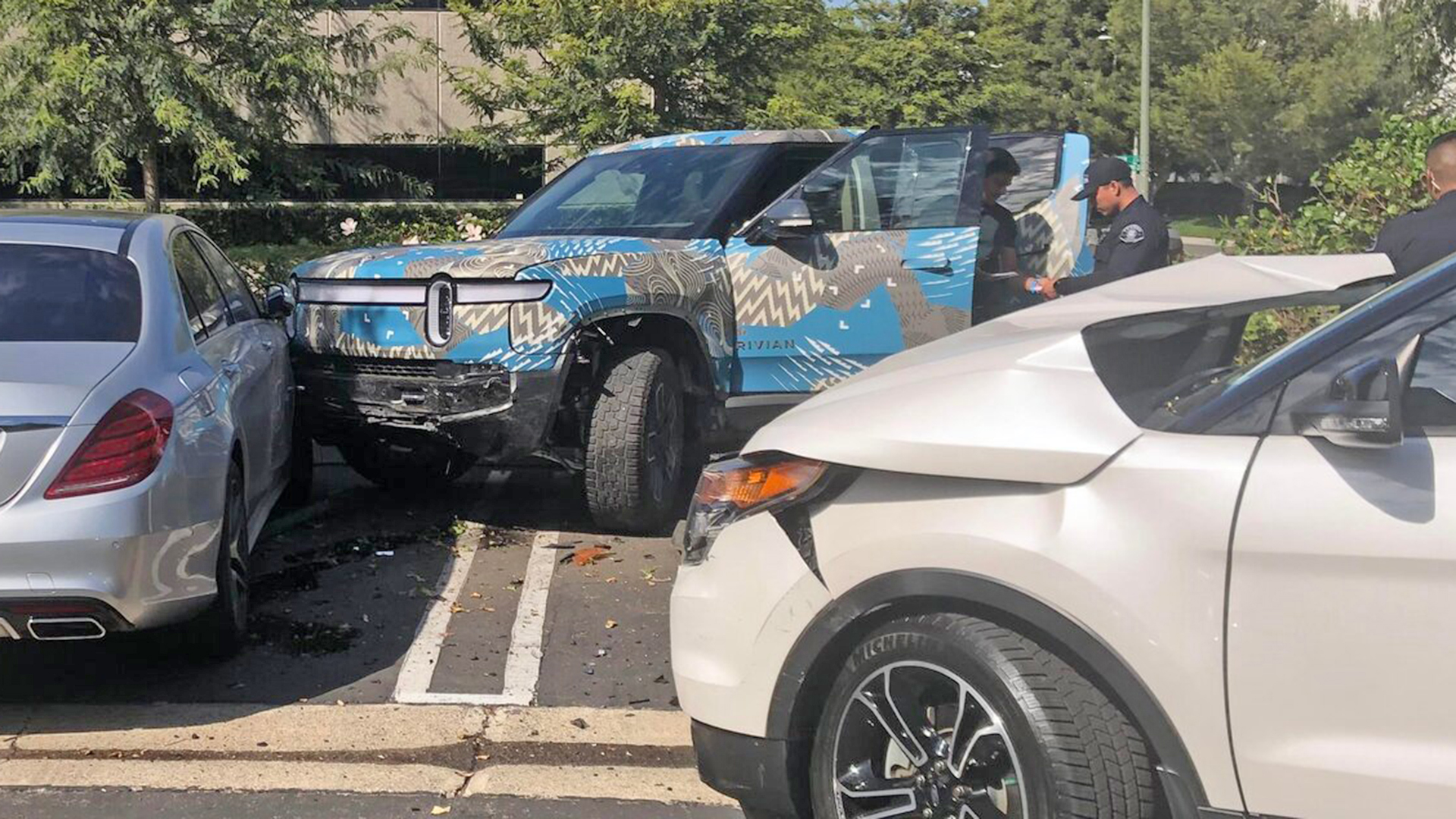

To say September’s been a big month for Rivian is an understatement—after over a decade of painstaking prep, the first production Rivian R1T electric pickup drove off the line at its Illinois factory to much fanfare. Unfortunately, yesterday in California another R1T still clad in testing camo drove up an embankment and into a parked Ford Explorer (to much less fanfare) in what appears to be the first crash of a Rivian on public roads. At such an important moment in the company’s history, a public crack-up like this has attracted a lot of attention and no small amount of speculation. In a statement to The Drive, Rivian confirmed the incident involving a prototype R1T, claiming the crash was the result of driver error, the driver (a company employee) is unharmed and that all safety systems “worked as intended.”
Still, there’s a lot to unpack. The crash took place near Rivian’s offices in a business park outside Irvine, California (here’s a link to the map). Based on photos from the scene and the trajectory of the truck, it appears the prototype R1T was headed south on Myford Road—a long, four-lane straight—when it failed to navigate a 90-degree turn at the end of the street and plowed wide into an adjacent parking lot, punting that poor Explorer out of its parking space and making contact with a Mercedes S-Class. Whether “driver error” means excessive speed, inattention or something else, we can’t say. Obviously, a crash caused by a mechanical issue could have significant implications as the company rolls out the production R1T. While we can’t verify Rivian’s claim, the circumstances do point to human error.



So, there’s that. The claim that all safety systems “worked as intended” is a little more curious, because like any new vehicle worth its salt, the production Rivian has a big standard suite of driver-assistance and crash-prevention features that don’t appear to have helped in this situation—though being a prototype we can’t say whether all systems were active. Furthermore, reading through the list and looking at the crash site, it’s also not clear that any of them would’ve stopped it. Things like forward collision warning, automatic emergency braking, and lane keep warning/assistance wouldn’t necessarily prevent the R1T from going off a surface street (though it does also have “Dynamic Brake Support,” which is supposed to “support your braking to help mitigate or prevent a collision”). And like GM’s Super Cruise, Rivian’s Driver+ hands-free mode only works on certain highways, so it’s safe to say it wasn’t involved here. Or if it was, it’s well outside the intended use case.

There is one other weird element: the photo of the R1T’s tire tracks (thanks, quad-motor AWD setup!) going up the embankment appear to show the truck was still accelerating as it left the roadway, or at the very least, not slowing down at all. You can see the grass is flattened backwards towards the road in places, rather than being flattened forwards as it would if the truck was digging in under braking. And the damage to the Ford Explorer makes it clear the Rivian hit it while still carrying a fair amount of speed. That could also be explained by a panicked driver accidentally mashing the throttle instead of the brake, but again, this is all armchair detective work.
What is plainly evident is that as a truck with a 3.0-second 0-60 time weighing a minimum of 6,300 pounds, the Rivian R1T is a force to be reckoned with in a collision. Compare the crumpled Explorer to the scuffed up front end of the R1T—there’s doubtlessly some unseen damage, as its two front wheels appear to be pointing in opposite directions, but it faired far better. At the risk of drawing a too-big conclusion, it’s another data point in the still mostly unexplored question of how EVs and older combustion vehicles will fare in crashes. Based on what we’ve seen with Teslas so far, the answer is the electric car usually wins.

We’ll update this post with more information as we get it. For now, the story that Rivian’s telling is one of driver error. And for its sake, hopefully it stays that way.
Got a tip? Send us a note: tips@thedrive.com